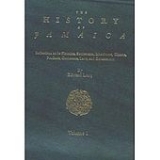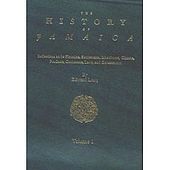
Edward Long
Encyclopedia
Edward Long was a British colonial administrator and historian, and author of an influential work, The History of Jamaica (1774).
- descended from the Long family of Wiltshire, his great-great-grandfather, Samuel Long, had arrived on the island in 1655 as a lieutenant
in the English army of conquest - and the family established itself as part of the island's governing planter elite. His sister, Catherine Maria Long, had married Sir Henry Moore, 1st Baronet
(Governor of Jamaica
), and it is believed that Edward went to Jamaica to become private secretary to Sir Henry.
Long was born August 23, 1734 at St. Blazey, in Cornwall
. He became a law student in 1752 at Gray's Inn
, and from 1757 until 1769 he was resident in Jamaica, during which period he explored inside the Riverhead Cave, the Runaway Bay Caves
and the Green Grotto. He became Lieutenant-governor, and later a judge in the local vice admiralty court
. He was an influential and wealthy member of British society, as well as an established Jamaican planter and slave
r. In 1758, he married Mary, the daughter of Thomas Beckford, widow of John Palmer of ‘Springvale’ in Jamaica. After the birth of their fourth child in 1769, the family returned to England
due to Long's poor health. Twin sons (the elder of whom was Robert Ballard Long
) were born in 1771 at Chichester
. Edward Long died in 1813 at Arundel Park, Sussex
, the seat of his son-in-law, Henry Molyneux-Howard
, Esq., M.P.
Long was a polygenist who claimed that the White race was a different species to the Black race.
 Long's History of Jamaica, first published in 1774 in three volumes but again in the 1970s, was his greatest work. This book gives a political, social, and economic history with a survey of the island, parish by parish from 1665 to 1774. It is a classic in its field and, even today it contains what is still one of the best and most complete accounts of colonial government in existence. The work is also important, because it presents a clear picture of conditions in the island on the eve of the American revolution
Long's History of Jamaica, first published in 1774 in three volumes but again in the 1970s, was his greatest work. This book gives a political, social, and economic history with a survey of the island, parish by parish from 1665 to 1774. It is a classic in its field and, even today it contains what is still one of the best and most complete accounts of colonial government in existence. The work is also important, because it presents a clear picture of conditions in the island on the eve of the American revolution
which was destined to bring ruin to so many planters and slavers.
The book also contains a racist yet influential description of American Negro
slaves during the Age of Enlightenment
. Long's description of race discussed it as a more natural state compared to the Romantic period. Long argues that American Negroes are characterised by the same “bestial manners, stupidity and vices which debase their brethren” in Africa. This race of people is distinguishable from the rest of mankind in that they embody “every species of inherent turpitude” and imperfection that can be found dispersed among all other races of men. Unlike the most “abandoned villain” to be found in civilisation, these peoples have no redeeming qualities whatsoever. He echoes Hume and Kant and finds it astonishing that despite being subject to colonisation and integration into European society for hundreds of years, the Negroes have failed to demonstrate any appreciation for the arts or any inventive ability. He observes that throughout the entirety of Africa, there are few natives who “comprehend anything of mechanic arts or manufacture”, and those who do, perform their work in the manner of some under-evolved ape. This is due to them being "void of genius". The book also contains descriptions of interracial marriage
. In the book he included a poem by Francis Williams.
Life
Long's family had been long associated with JamaicaJamaica
Jamaica is an island nation of the Greater Antilles, in length, up to in width and 10,990 square kilometres in area. It is situated in the Caribbean Sea, about south of Cuba, and west of Hispaniola, the island harbouring the nation-states Haiti and the Dominican Republic...
- descended from the Long family of Wiltshire, his great-great-grandfather, Samuel Long, had arrived on the island in 1655 as a lieutenant
Lieutenant
A lieutenant is a junior commissioned officer in many nations' armed forces. Typically, the rank of lieutenant in naval usage, while still a junior officer rank, is senior to the army rank...
in the English army of conquest - and the family established itself as part of the island's governing planter elite. His sister, Catherine Maria Long, had married Sir Henry Moore, 1st Baronet
Sir Henry Moore, 1st Baronet
Sir Henry Moore, 1st Baronet was a British colonial leader who served as royal Governor of Province of New York from 1765 to 1769.-Early life:...
(Governor of Jamaica
Jamaica
Jamaica is an island nation of the Greater Antilles, in length, up to in width and 10,990 square kilometres in area. It is situated in the Caribbean Sea, about south of Cuba, and west of Hispaniola, the island harbouring the nation-states Haiti and the Dominican Republic...
), and it is believed that Edward went to Jamaica to become private secretary to Sir Henry.
Long was born August 23, 1734 at St. Blazey, in Cornwall
Cornwall
Cornwall is a unitary authority and ceremonial county of England, within the United Kingdom. It is bordered to the north and west by the Celtic Sea, to the south by the English Channel, and to the east by the county of Devon, over the River Tamar. Cornwall has a population of , and covers an area of...
. He became a law student in 1752 at Gray's Inn
Gray's Inn
The Honourable Society of Gray's Inn, commonly known as Gray's Inn, is one of the four Inns of Court in London. To be called to the Bar and practise as a barrister in England and Wales, an individual must belong to one of these Inns...
, and from 1757 until 1769 he was resident in Jamaica, during which period he explored inside the Riverhead Cave, the Runaway Bay Caves
Green Grotto Caves
The Green Grotto Caves are show caves and a prominent tourist attraction in Discovery Bay, St Ann on the north coast of Jamaica. Named for the green algae that cover its walls, the structure of the cave is strikingly different to inland systems; the cave is a Flank Margin Cave with two...
and the Green Grotto. He became Lieutenant-governor, and later a judge in the local vice admiralty court
Vice admiralty court
Vice admiralty courts were juryless courts located in British colonies that were granted jurisdiction over local legal matters related to maritime activities, such as disputes between merchants and seamen. Judges were given 5% of confiscated cargo, if they found a smuggling defendant guilty...
. He was an influential and wealthy member of British society, as well as an established Jamaican planter and slave
Slavery
Slavery is a system under which people are treated as property to be bought and sold, and are forced to work. Slaves can be held against their will from the time of their capture, purchase or birth, and deprived of the right to leave, to refuse to work, or to demand compensation...
r. In 1758, he married Mary, the daughter of Thomas Beckford, widow of John Palmer of ‘Springvale’ in Jamaica. After the birth of their fourth child in 1769, the family returned to England
England
England is a country that is part of the United Kingdom. It shares land borders with Scotland to the north and Wales to the west; the Irish Sea is to the north west, the Celtic Sea to the south west, with the North Sea to the east and the English Channel to the south separating it from continental...
due to Long's poor health. Twin sons (the elder of whom was Robert Ballard Long
Robert Ballard Long
Lieutenant-General Robert Ballard Long was an officer of the British and Hanoverian Armies who despite extensive service during the French Revolutionary and Napoleonic Wars never managed to achieve high command due to his abrasive manner with his superiors and his alleged tactical ineptitude...
) were born in 1771 at Chichester
Chichester
Chichester is a cathedral city in West Sussex, within the historic County of Sussex, South-East England. It has a long history as a settlement; its Roman past and its subsequent importance in Anglo-Saxon times are only its beginnings...
. Edward Long died in 1813 at Arundel Park, Sussex
Sussex
Sussex , from the Old English Sūþsēaxe , is an historic county in South East England corresponding roughly in area to the ancient Kingdom of Sussex. It is bounded on the north by Surrey, east by Kent, south by the English Channel, and west by Hampshire, and is divided for local government into West...
, the seat of his son-in-law, Henry Molyneux-Howard
Lord Henry Howard-Molyneux-Howard
Lord Henry Thomas Howard-Molyneux-Howard , known as Henry Thomas Howard until 1812 and Henry Thomas Molyneux-Howard until 1817, was a British gentleman who served as Deputy Earl Marshal in the latter part of the reign of George III and early in the reign of George IV.Howard was the son of Henry...
, Esq., M.P.
Long was a polygenist who claimed that the White race was a different species to the Black race.
History of Jamaica

American Revolution
The American Revolution was the political upheaval during the last half of the 18th century in which thirteen colonies in North America joined together to break free from the British Empire, combining to become the United States of America...
which was destined to bring ruin to so many planters and slavers.
The book also contains a racist yet influential description of American Negro
Negro
The word Negro is used in the English-speaking world to refer to a person of black ancestry or appearance, whether of African descent or not...
slaves during the Age of Enlightenment
Age of Enlightenment
The Age of Enlightenment was an elite cultural movement of intellectuals in 18th century Europe that sought to mobilize the power of reason in order to reform society and advance knowledge. It promoted intellectual interchange and opposed intolerance and abuses in church and state...
. Long's description of race discussed it as a more natural state compared to the Romantic period. Long argues that American Negroes are characterised by the same “bestial manners, stupidity and vices which debase their brethren” in Africa. This race of people is distinguishable from the rest of mankind in that they embody “every species of inherent turpitude” and imperfection that can be found dispersed among all other races of men. Unlike the most “abandoned villain” to be found in civilisation, these peoples have no redeeming qualities whatsoever. He echoes Hume and Kant and finds it astonishing that despite being subject to colonisation and integration into European society for hundreds of years, the Negroes have failed to demonstrate any appreciation for the arts or any inventive ability. He observes that throughout the entirety of Africa, there are few natives who “comprehend anything of mechanic arts or manufacture”, and those who do, perform their work in the manner of some under-evolved ape. This is due to them being "void of genius". The book also contains descriptions of interracial marriage
Interracial marriage
Interracial marriage occurs when two people of differing racial groups marry. This is a form of exogamy and can be seen in the broader context of miscegenation .-Legality of interracial marriage:In the Western world certain jurisdictions have had regulations...
. In the book he included a poem by Francis Williams.

